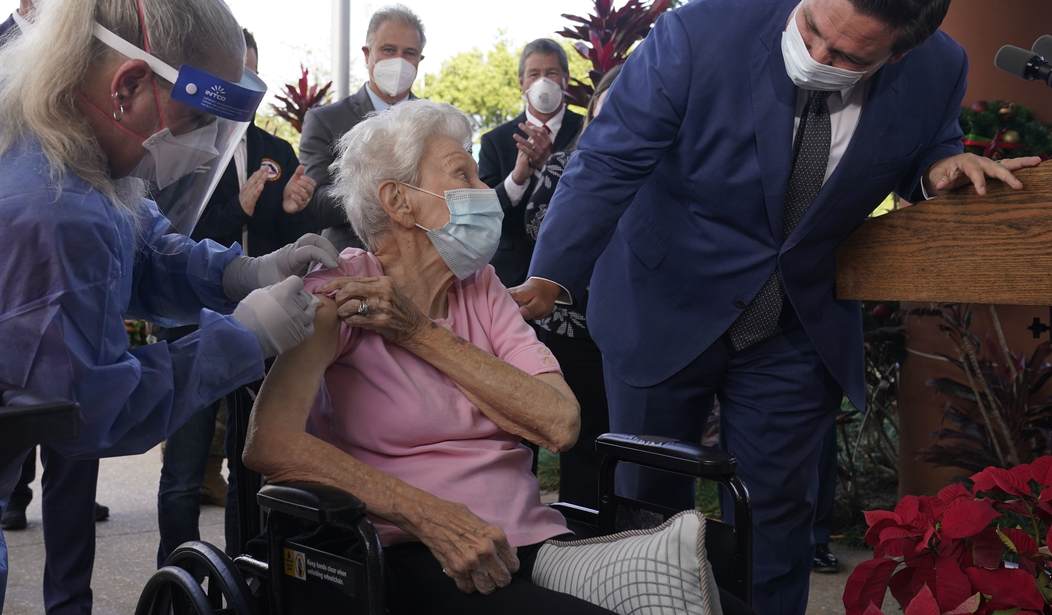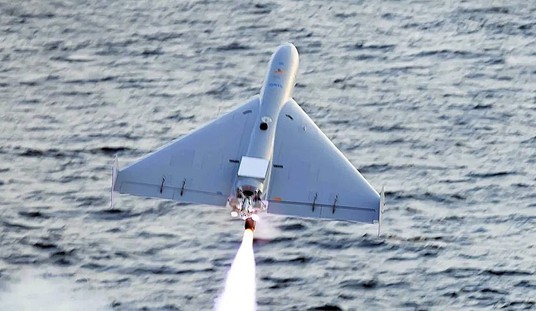A headline from 10 days ago…

…and a headline from this afternoon:

I’m annoyed at the prospect of having to get another dose so soon, knowing that the side effects are likely to be unpleasant, but I’m also thinking of Louis CK’s bit on people who complain about air travel. It’s cramped and the food sucks but you’re in a chair in the sky, traveling at phenomenal speed to arrive at any destination on Earth in a matter of hours. It’s miraculous.
Forced to choose between enduring a global pandemic in which new variants arise regularly and lay waste to the population and having to take a miracle drug every six months that renders me invincible in exchange for a few hours of fever, I suppose I’ll take door number two.
On Thursday, Pfizer’s Dr. Mikael Dolsten told The Associated Press that early data from the company’s booster study suggests people’s antibody levels jump five- to 10-fold after a third dose, compared to their second dose months earlier.
In August, Pfizer plans to ask the Food and Drug Administration for emergency authorization of a third dose, he said.
Why might that matter for fighting the delta variant? Dolsten pointed to data from Britain and Israel showing the Pfizer vaccine “neutralizes the delta variant very well.” The assumption, he said, is that when antibodies drop low enough, the delta virus eventually could cause a mild infection before the immune system kicks back in.
There are two ways to attack the B.1.617 “Delta” variant. One is to give a third shot of the original Pfizer formula to boost antibodies further, which is what the company is testing now. The other is to tweak the formula so that the antibodies it evokes in new recipients are better tailored to combat Delta. Pfizer’s working on that too. Which of the two approaches the experts end up recommending is unclear.
They may not recommend either, as there’s no hard evidence at the moment that a booster is necessary. Even the “bad news” about Delta this week came packaged with excellent news: Although Pfizer’s vaccine is only 64 percent effective at preventing infection by the variant, it’s still more than 90 percent effective at preventing serious illness. The goal of the vaccines is to keep people out of the hospital, right? Well, two shots of Pfizer does that. So why do we need three?
That’s not an academic question, it’s a logistical one. We’re having enough trouble getting two doses into people; imagine how many would flake out if told they needed to get a third. Pharmacies would suddenly have to juggle the usual daily doses for people getting their first or second shots with third doses for everyone else. On top of that, a booster might backfire by convincing vaccine holdouts that they’ll be on the hook for frequent jabs forever once they decide to begin their regimen. I remember one unvaccinated Republican telling Frank Luntz during a focus group a few months ago that he was reluctant to get his first dose because the head of Pfizer had already begun chattering about a booster for the fall, raising the prospect of “shot after shot after shot.”
Now here’s Pfizer announcing that they’ll seek FDA authorization for a third dose. That’s prudent because of the threat from Delta, but who knows what effect it might have on fencesitters who are still deciding whether to get immunized.
Jeremy Faust, an ER doctor who’s written frequently about COVID, is cautious for now:
What I’m saying is that lower antibody levels alone may not be enough to go on to recommend boosters for adults in particular. We want *patient outcome data*, not antibody numbers that haven’t been correlated to anything. (Albeit that’s not true in every case nor at the extremes)
— Jeremy Faust MD MS (ER physician) (@jeremyfaust) July 8, 2021
Yeah, it seems insane to devote time, money, and energy to getting third doses into people which aren’t even needed to prevent severe illness when there are still millions out there who need their two doses of protection from Delta. And I emphasize “two doses”: A new study out today makes clear that one dose of the vaccines does practically nothing to stop B.1.617. Not only that, Delta also seems to do better than other variants do against antibodies produced by unvaccinated people who’ve had COVID previously.
The researchers looked at blood samples from 103 people who had been infected with the coronavirus. Delta was much less sensitive than Alpha to samples from unvaccinated people in this group, the study found…
The team also analyzed samples from 59 people after they had received the first and second doses of the AstraZeneca or Pfizer-BioNTech vaccines.
Blood samples from just 10 percent of people immunized with one dose of the AstraZeneca or the Pfizer-BioNTech vaccines were able to neutralize the Delta and Beta variants in laboratory experiments. But a second dose boosted that number to 95 percent. There was no major difference in the levels of antibodies elicited by the two vaccines.
It’s vitally important now that people who haven’t been vaxxed yet but want to be are able to get their shots as quickly as possible. Adding a third dose of Pfizer to that mix to boost those who are already safe seems like a needless complication, at least before fall. Interestingly, in fact, although he’s known for taking an “abundance of caution” approach to all things COVID, Anthony Fauci has been keen to stress lately how well two doses of the vaccine do against Delta in studies — even going so far today as to politely question the Israeli data that showed a steep drop in the vaccine’s ability to prevent infection. Fauci’s strategy now is clearly to encourage vaccination to whatever extent possible in order to head off B.1.617. Reassuring people that the vaccines are extremely effective, especially against serious illness, is a way to entice them into getting their shots. I’m curious to see whether he treats the news about a Pfizer booster as an unhelpful distraction from that project.








Join the conversation as a VIP Member